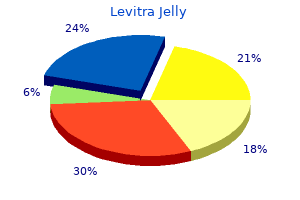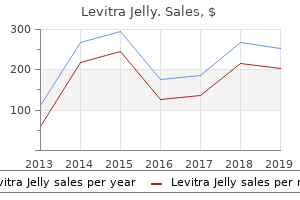"Buy levitra jelly paypal, erectile dysfunction doctors in queens ny".
By: X. Sibur-Narad, M.A., Ph.D.
Assistant Professor, Oregon Health & Science University School of Medicine
Cognizant of the normativity and invisibility of whiteness and the status my race affords me erectile dysfunction diabetes reversible cheap 20 mg levitra jelly overnight delivery, I wanted to name it and on the first day I introduced myself to the students as a white person erectile dysfunction drug coupons 20mg levitra jelly overnight delivery. I wondered about their responses; a sort of d`uh or white professors don`t do that impotence nitric oxide discount levitra jelly 20mg on line, but this was an easy and even privileged action for me erectile dysfunction 34 levitra jelly 20 mg with amex. I did not fear any challenges to my intellectual authority and legitimacy on that first day nor did I experience them at any point throughout the term (see Harlow 2003). Nevertheless, I am not a race scholar; race and ethnic relations was not one of my graduate areas of study, and while my position as the lone on-campus sociologist requires that I teach a range of new courses, teaching this particular class demands a greater sense of accountability and attention to systems of dominance and oppression that benefit me. Those of us who wish to serve as allies need to continue doing self work and move beyond acknowledging our privileges to taking responsibility for institutional change. Even though our project was university-centered, we could have more strongly linked the structural racism at our institution with systematic problems found in higher education, particularly those noted by Black Lives Matter activists within academia, including educational attainment levels, curriculum changes, and cost constraints of higher education. Reflecting upon implementation of the project, the students and I shared many of the same practical concerns. Not surprisingly, time limitations and time management are among the primary challenges for a project like this. Realistically, unless the project is conducted in a methods course, instructors must be prepared to take on a substantial part of the work. Thus, there was a trade-off between keeping the project on track and on schedule, and making sure the student research experience was solid. From the beginning of the term I told students I wanted this to be a collaborative project. Success on this front is uncertain; students reported that while the workload was evenly distributed, this was less of a group project, but. Students felt guidance was strong, but expressed preference for more time for interviews, discussion of data, and presentation preparation. Healey-Etten and Sharp 2010) to guide our class discussions on conducting interviews and developing the interview guide. While I felt students were prepared for the formal presentation, I now recognize I should have scheduled more practice time. A final consideration is the importance of trust and respect in the classroom; on the whole, this project would not have succeeded without a strong level of trust and accountability among students and between the students and me. Upon later reflection, I wondered, "was I playing the role of the liberal progressive? At times I struggle with the imposter syndrome and engage in emotion work in ways that I doubt most of my male peers do. Yet, I have tried to be conscious of my privilege as a white, heterosexual, (yet untenured) university professor. In this class, I did not pretend to be objective about social inequalities and I imagine that it worked to my advantage to be female in a class of all women. Nevertheless, my race dominates among faculty, including all of us in social science. My race shapes my pedagogy, reinforcing the dominant white culture in ways I don`t always see or acknowledge (see Hytten and Adkins 2001). When interviewees were asked, Who do you think is doing the most to address these issues? For years, the few Native professors and staff have critiqued Conclusion: How Does Race Still Matter? By the end of the term, students in the Race and Ethnicity class had not only learned that race still matters, but through their class project they had learned how it still matters to members of their campus community. This was especially relevant for understanding Native Alaskan identity and racism towards Alaska Natives on campus. Many Alaska Native interviewees expressed Native pride, with one interviewee stating, I`m privileged to be indigenous to this place. On the flipside, another Native interviewee stated, It [lack of racial diversity on campus] affects me because it has often made me feel like a lone voice shrieking in the wilderness. It has frustrated me, alienated me, angered me, with another reporting, I have been the object of micro-aggressions many times. A white interviewee describing stigma stated, academically, professors see me differently because I am white. If I was Native, they wouldn`t think I was as motivated, but more interviewees reported experiences or observations of reverse racism and at least one person thought only certain groups were allowed to practice their traditions on campus and found this unfair. While this project was inspired by Black Lives Matter, the small proportion of African Americans on campus meant that our findings were not directly related to the primary grievances expressed by the movement such as state sanctioned violence against black bodies, black liberation, and investment in black communities.

In 2000 erectile dysfunction doctor sydney order 20 mg levitra jelly otc, they added an markets a season ahead of production erectile dysfunction doctors staten island order levitra jelly in united states online, so founded the Texas Organic Cotton old flame weeder to their non-chemical she gambles on whether the quantity of the Marketing Co-op erectile dysfunction protocol pdf free purchase levitra jelly discount. Once they were certified age for erectile dysfunction cheap levitra jelly 20mg with amex, LaRhea took on handles a customs dispute when $80,000 the challenging task of marketing their new worth of tampons are detained from enterToday, membership hovers around 30 famcotton product. In 2000, the co-op produced more niche that would pay more at the farm to Nevada to negotiate with owners of a new than 6,000 bales, about one-third of all gate," she says. Once the state Department mill who claim they need to spray the cotton organic cotton grown in the United States. The first obstacle was because a product was not on the shelves, Organic Essentials to produce and distribthat the manufacturers looking to buy organyou never recoup that," she says about the ute health products such as cotton balls, ic fabric only wanted to buy small amounts. More than facturers a six-month projection of how the risk paid off by moving more of their Many co-op members have stated that if they had not converted to organic, their farms would no longer be economically viable. We have chosen to accept our responsibility as stewards of the land and it is important to show what can be done without chemicals. While cotton production was never as chemically dependent in the arid High Plains as in the Deep South, Minter had witnessed increasing use of defoliants and pesticides as farmers tried to compensate for low prices by boosting yield. Thirteen employees keep telephones and computers humming in the handsome building that houses all three enterprises. LaRhea is looking for another building to renovate so that Organic Essentials can have room to grow. The fact that partnerships have developed with international companies such as EcoSport, Nike, Norm Thompson and Patagonia inspires this group of farmers to dream of their own vertical operation. Transition Advice LaRhea warns that a new-generation cooperative breaks new ground when they start adding value to their collective farm product. Unity of purpose and group-decision making are more crucial for such a protracted relationship. For example, cotton co-op members get no payment in the fall except the government loan value of their crop. She also advises that a business plan is as important for a cooperative as it is for a corporation. Instead of being allowed to put up with a small amount of damage, organic cotton farmers could be forced to plow under their crop if state inspectors deem a field too infested with the weevils. Just the threat of government interference has scared a few organic farmers back to conventional production. If enough organic growers give up, Cotton Plus and Organic Essentials could run short on raw material. Thomas a challenge: a protracted dry season, steep terrain and complicated leasing arrangements operated by the government, which owns most of the tillable land. The difficulties are causing young people to dismiss farming as an option, something Lucien Samuel and Benita Martin try to combat by demonstrating how a small farm can be profitable and provide the base for ecologically friendly living. Thomas is tropical, with steep hillsides and lots of rainfall at certain times of the year. Background Lucien Samuel, the youngest of 10 siblings, is one of the only members of his family to stay in St. Raised on a farm his parents operated mostly as a means to feed their large family, Samuel grew up helping raise a large garden full of produce as well as chickens and goats. He spent his early adult years working as a handyman in some of the larger communities on the island. But when he decided to farm, he returned to Estate Bordeaux on the northern part of St. Benita, a Michigan native, knew nothing about farming, but has come to enjoy it as "one of the best, most basic things a person can do. The average annual temperature is in the mid-70s, and the only factor that really stops cultivation, for a period of six weeks or so each year, is the predictable dry spell in mid-to late-summer. From extensive reading, and consultation with other farmers on the island as well as the mainland U. He plants cucumbers among his stands of lemongrass, for example, because the crawling vines take advantage of the substantial grass stalks. He plants basil alongside collard greens because the basil wards off pests, and intersperses marigolds with mint for the same benefit.

Palmer and Henderson share responsibility for overall planning and management erectile dysfunction treatment in mumbai buy levitra jelly 20 mg overnight delivery, but each has his or her own primary responsibilities erectile dysfunction medication injection generic 20 mg levitra jelly fast delivery. Henderson tills and cultivates erectile dysfunction patanjali medicine discount levitra jelly 20mg otc, does most of the greenhouse planting work long term erectile dysfunction treatment generic levitra jelly 20 mg mastercard, and since she lives at the farm, tends to pick 72 the New American Farmer, 2nd edition up most of the loose ends. On mornings when members come to the farm to fulfill their work requirements, the farmers work with them. From a season-long work schedule, to detailed instructions about what to wear and bring, to directions for harvesting vegetables, Henderson makes sure shareholders are prepared to be successful contributors to the farm. Economics and Profitability Henderson, Palmer and Chickering have structured Peacework Farm so its revenue covers all farm expenses including labor without incurring debt. Three years ago, Henderson put $35,000 into the farm and has since received $42,000 back. The rotations and cover crops are designed to prevent erosion, maintain and build soil quality and control pest pressures. After harvesting a spring crop, Henderson and Palmer typically plant a buckwheat cover crop, incorporate that and then sow an oat cover crop for the winter. We mow the cover crop in June, spade the bed, and let it set for three weeks and then spade again. Through her books - she co-authored the Real Dirt and Sharing the Harvest - conference appearances, and grassroots organizing and advocacy, she has influenced scores of farmers, other agricultural professionals and policy makers at the local, state and national level. Gordon Jones had worked hard to improve forage quality for his dairy herd, but getting crop work done on schedule was a huge challenge because his labor-intensive operation kept him inside the barn doing chores until noon every day. Even before their children were born, Gordon and Marion were determined that family would always be their first priority. Their dairy operation made it difficult to find time for their two young daughters. Grazing has enabled them to make the best use of their resources and facilities; make gains in herd health and forage quality; reap savings in feed, bedding, and labor costs; and have more time together as a family. Focal Point of Operation - Holistic planning and managed grazing Gordon and Marion Jones prove that smaller dairies can be profitable and support quality family life. These winners of the 1999 state Green Pastures Award milk 65 cows in an older, 50-stanchion barn. They have accomplished this by planning and focusing on their priorities, managing their finances carefully, and testing new ideas and adapting them to their operation. Now, a former hay field retains a little alfalfa and timothy, but has evolved mostly to white clover, bluegrass and orchardgrass. Instead, they time grazing to benefit the species they want to predominate, rotating their herd in and out of 1. Cow health improved, and slow-moving, older cows with foot and leg problems were rejuvenated. Milk quality as measured by somatic cell count, an indicator of udder infection, improved. Since switching to pasture, the mostly Holstein herd has averaged from 23,000 to up to 25,000 pounds of milk. To help get crop work done on time, they hire custom operators to do some manure application and harrowing in the spring, and share labor and equipment with a neighboring farmer. Their first-cut haylage in 1999 tested 18 to 21 percent protein, quite high for the Northeast. The Joneses could not keep their promise to take time off without hiring some nonfamily help. They rely on local young people and summer interns from the University of New Hampshire. The Joneses succeed in meeting their goals and maintaining balance in their lives and their business by staying focused on their core values and priorities. They have begun saving for retirement, and their daughters save most of the money they earn helping on the farm for college.
To that end erectile dysfunction cure order cheapest levitra jelly and levitra jelly, he has committed to teaching kids about ranching and nature throughout Lusk and Niobrara counties and beyond medication that causes erectile dysfunction purchase online levitra jelly. The on-ranch curriculum he helped develop includes the lifecycle of a log high cholesterol causes erectile dysfunction levitra jelly 20mg generic, the lifecycle of a stream erectile dysfunction injections cost generic levitra jelly 20 mg amex, insects, stream salinity and the web of life. He has helped train teachers across Wyoming about ranching - and ranching within nature. Above all, he wants kids from the city to see that ranchers are not bad for the land and are, in fact, active agents for environmental improvement. With a processor nearby, he hopes to shift some of his sales from wholesale to direct. Other relatives raise and label their meat as "natural" beef, meaning that during production it was not treated with antibiotics or hormones. When he graduated from an agricultural college in the 1960s, Mike Heath began growing potatoes in Idaho much as he had been taught - applying fungicides at regular intervals as the labels dictated. Those methods were not only expensive, but they also ignored the potential of a systems approach to control crop-damaging pests. With Idaho potato producers earning just 2-4 cents per pound of potatoes in 2000, the future does not look bright for area farmers unwilling or unable to reduce input prices, diversify or add value to their product. Background In 1969, Heath went to Malaysia and the South Pacific islands as part of a church program to help farmers improve their production practices. A young farmer who had gone to the University of Idaho to study "modern" agriculture, Heath received an eye-opening crash course in farming without chemicals. Working with Chinese farmers who had relocated to Malaysia, Heath was fascinated by their integrated approach to raising crops and livestock for small markets. With his former in-laws on their farm, he grew grain, sweet corn and hay and began trying to grow the latter organically. He imported ladybugs to help control aphids rather than the standard spraying and began better managing crop rotations. When market prices dipped, he added other vegetables, becoming one of the first Idaho growers to raise squash. Raising potatoes, specialty beans, tomatoes, winter squash, alfalfa, dry beans, sweet corn, wheat, barley and hay not only opens up niche markets, but also helps limit pests that thrive on a single food source. Heath is different from other Idaho farmers because he grows mixed vegetables on two acres and raises cattle and chickens to earn extra income and provide soil fertility. Every five or six years, Heath rotates his crop and vegetable fields into an alfalfa crop, which he leaves for two or three years. His rotation spans about seven years: alfalfa hay for at least three, followed by a row crop like potatoes, beans or sweet corn, then a year of wheat or barley. In year six, Heath plants another row crop, follows with a year of a grain, then rotates back to hay. Each year, he grows a variety of vegetables too numerous to list - 12 different kinds of squash on 20 acres, for example. Heath sells wheat organically to a national wholesaler and barley as malt to a national brewery. In a symbiotic relationship, Heath sells hay to area dairies and receives compost along with payment. Recently, Heath added a season-extending greenhouse, with organic lettuce as a main crop. The farm supports a healthy number of beneficial insects, and Heath keeps preda- crops. Instead, he sells the yearlings on the open market - after retaining some for the family. The chickens roost in a hen house and have regular access to a one-acre pasture, where they spread their own manure. They eat Karen Murphy Michael and Marie Heath rotate a wide variety of crops to both open up niche markets and limit pests. Heath grows potatoes far from previous potato plots - or lets five to seven years elapse. With the University of Idaho, Heath is fine-tuning his rotation to better control the beetles, growing winter wheat after potatoes to confuse the beetles with a tall canopy.
Discount 20mg levitra jelly overnight delivery. Penile Injection Therapy Instructions w/Inject-Erect.




